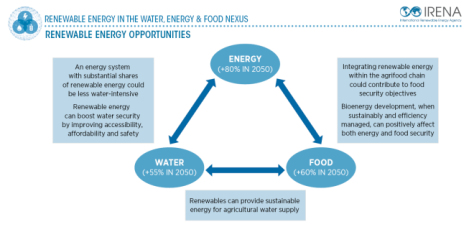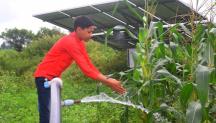

Water for Development
Newsletter
Water is central to all aspects of human and societal progress. Without it, we cannot lead healthy lives, nor produce food and energy. Water security is both a condition for and a result of sustainable development and will figure prominently in the post-2015 Sustainable Development Goals.
One of the main conclusions drawn from the recent World Water Week event in Stockholm was that water scarcity is a key development challenge of the 21st century, which also poses fundamental threats to energy security. In this context, renewable energy can provide solutions and the following are some points to consider.
The importance of looking at water and energy issues together
The energy sector is heavily reliant on water, accounting for around 15 per cent of water withdrawals globally. Water is consumed along different stages of energy production including primary fuel extraction and processing, and power generation. 2.8 billion people already live in areas of high water stress. In the future, the UN predicts a 40 per cent shortfall in global water supply by 2030. In light of these dynamics, along with the uncertainty of climate change, future development for the energy sector needs to account for water constraints and, in the long-term, strive towards reducing the water intensity of power generation. These objectives are in consonance with efforts to transition towards a renewable energy-based energy sector.
Renewable energy conserves water while decarbonizing the energy sector and enhancing access and energy security.
IRENA analysis finds that on the back of a substantial scale-up in renewable energy deployment, in particular solar PV and wind, water withdrawals in 2030 could decline by nearly half for the United Kingdom, by more than a quarter for the United States, Germany and Australia, and over 10 per cent in India.
“During power generation, solar power withdraws 200 times less water than a coal power plant to produce the same amount of electricity. Wind power requires no water.” – Adnan Z. Amin, IRENA Director-General
The United States EPA’s Clean Power Plan, while representing a historic and important step in reducing carbon pollution from power plants, would also deliver significant benefits for water in terms of reduced water intensity of power production and less risk for water pollution. This would also contribute to climate-proofing the energy system.
Renewable energy can also provide energy inputs in the water sector.
Solar-based pumping solutions are expanding access to water. The distributed and modular nature of solar-based solutions has enabled improved access to water services to rural and peri-urban areas without them. India has launched a programme to deploy 20,000 solar pumping systems in rural areas where drinking water supply infrastructure is non-existent or is not functional due to non-availability of electricity. Solar water pumps are also in place in Bangladesh and Dabaab, Kenya, one of the largest refugee camps in the world, providing clean drinking water for vulnerable communities. Solar pumping solutions are also being used to supply water for irrigation.

IRENA infographic on the water-energy-food nexus
Renewable energy could power desalination plants, which are currently very energy-intensive and largely fossil-fuel-based.
According to the 2030 Water Resources Group, energy accounts for more than 50 per cent of the economic cost of desalination plants. Renewables are fast emerging as an alternative energy source to cater to the heat or electricity needs of desalination plants. For example, the world’s largest solar‑powered desalination plant is being built in Saudi Arabia with a local water firm. The USD 130 million facility will desalinate 60,000 cubic metres of seawater each day, ensuring a stable supply of drinking water throughout the year.
Renewable energy technologies lie at the intersection of water, energy and many other sectors and can serve as the basis for a sustainable expansion of these sectors to meet growing demand.
“In our globalized world, everything is interconnected. Water, energy and climate can no longer be thought of as separate issues. The only effective, immediately available solution to meet the rising demand for water and energy, while also mitigating climate change, is to scale up renewable energy and phase out fossil fuels.” – Adnan Z. Amin, IRENA Director-General
Read more about the Water, Food, Energy Nexus




